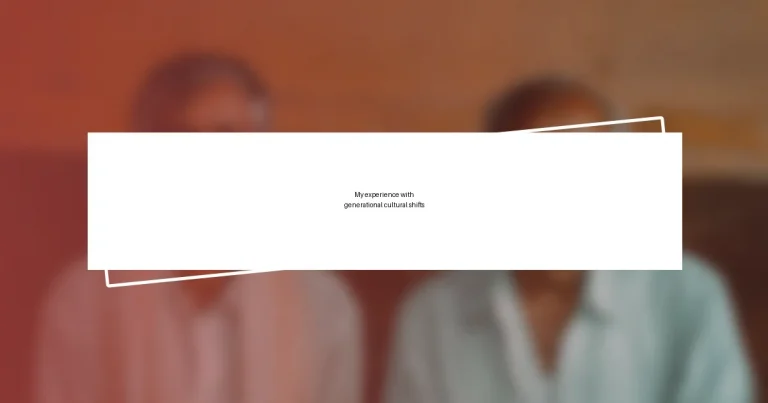Key takeaways:
- Generational cultural shifts are influenced by unique experiences, technology, and evolving societal values, leading to differences in perspectives on issues like work-life balance and sustainability.
- Technology fosters new communication methods and cultural exchange, but it can also overshadow deeper connections, emphasizing the need for balance between digital and in-person interactions.
- Building bridges between generations relies on effective communication, shared experiences, and openness to understanding differing viewpoints, which can enrich relationships and foster empathy.
- Personal growth often stems from engaging with unfamiliar perspectives and embracing moments of unity, highlighting the importance of shared experiences in navigating cultural transitions.

Understanding generational cultural shifts
Generational cultural shifts often stem from the unique experiences and challenges faced by different age groups. I remember vividly how my views on work-life balance were shaped by witnessing my parents’ relentless dedication to their careers. They believed that hard work defined success, yet, in my own journey, I’ve found that prioritizing mental well-being sometimes holds even greater importance.
Another aspect I find fascinating is how technology influences these shifts. Growing up in the age of the internet, I can’t help but reflect on how my social interactions transformed compared to my grandparents’ more traditional ways. Have you ever considered how a simple text or social media post can bridge the gap between generations, yet also create misunderstandings? While my grandmother treasures face-to-face conversations, I cherish the ease of digital communication, leading to a rich interplay of perspectives.
Observing these shifts has prompted me to question the narratives we inherit. Why do we cling to certain traditions, while others evolve with each new generation? In my experience, it’s essential to acknowledge these changes, as they help us navigate our identities in a rapidly shifting cultural landscape. Understanding these generational differences not only fosters better relationships but also enriches our collective knowledge.

Factors driving cultural changes
Cultural changes are often propelled by the evolving values and needs of society. I recall a time when the concept of sustainability was rarely discussed at family gatherings; now, it feels like an integral part of our conversations. I vividly remember my younger cousin passionately advocating for plant-based diets, something that my traditional relatives initially viewed with skepticism. This shift in values showcases how younger generations are often leading the charge for change, advocating for practices that prioritize our planet’s health.
Technology is another significant driver of cultural change. I still remember the excitement of receiving my first smartphone; it felt like a gateway to a world of information. This access altered not just how we communicate but also how we perceive and engage with various cultures. It’s striking to think about how platforms like Instagram have created global communities, allowing us to share ideas, experiences, and traditions across boundaries, much like the way I exchanged travel stories with friends from different backgrounds.
Life events also play a crucial role in shaping our cultural landscape. Personal milestones, such as becoming a parent, often spur individuals to reassess their beliefs and practices. I can pinpoint the moment I became acutely aware of the importance of diversity in education, prompted by the birth of my child. Suddenly, I found myself seeking inclusive narratives and representation, eager to instill a sense of belonging and acceptance in my family. This desire for growth amid change often drives cultural evolution, encouraging us to embrace new ideas and break away from outdated norms.
| Factor | Description |
|---|---|
| Values of Younger Generations | Younger people increasingly prioritize sustainability and social justice issues, influencing cultural norms. |
| Technology | Advanced communication tools facilitate cultural exchange and reshape social interactions. |
| Life Events | Personal milestones prompt reflection and reassessment of beliefs, driving cultural evolution. |

Impact of technology on culture
The impact of technology on culture is profound and pervasive, weaving itself into our daily lives. I recall a moment when I shared a significant life event through a video call with friends across the globe, a far cry from how my parents would have communicated. It was both exhilarating and a little daunting to navigate real-time reactions across different time zones. Our culture now embraces immediacy and interconnectedness, yet I can’t help but wonder if this speed sometimes overshadows deeper, more meaningful interactions.
- The rise of social media platforms fosters new ways of personal expression and identity formation.
- Instant access to information creates a culture of constant learning, but it can also lead to overwhelm.
- Changes in traditional practices, like remote work, shift our cultural understanding of workplace dynamics.
- Digital forums allow for cultural dialogues that transcend geographical boundaries, enriching our perspectives.
- However, reliance on technology can sometimes diminish the value of in-person connections.
Reflecting on these shifts, I’ve experienced the exhilarating freedom of connecting with diverse communities online. I remember participating in a virtual book club, where we discussed authors from various cultural backgrounds. It opened my eyes to perspectives I had never considered before. Yet, I can’t ignore a twinge of nostalgia for the intimacy of in-person gatherings, where energy flows in the room and laughter resonates. Balancing the two worlds is tricky, but it enriches my understanding of what culture can be in this digital age.

Effects on interpersonal relationships
As I reflect on my relationships, I can’t help but notice a significant transformation in how we connect with one another. A few years ago, family gatherings were filled with light conversation, but now, there’s often a palpable tension when differing views emerge—especially surrounding social issues. I remember a heated debate during a holiday dinner about environmental policies, where my young uncle passionately argued for change while my older relatives clung to traditional views. It made me realize that generational divides can create both friction and necessary discussions, as we navigate our differences.
Interpersonal relationships are deeply impacted by these cultural shifts. I’ve felt the weight of expectations morphing; seeking validation through social media can sometimes overshadow the simpler, authentic exchanges I cherish. When I reconnect with a childhood friend, we often reminisce over shared experiences rather than the curated versions of ourselves online. It’s a bittersweet realization—how technology can enrich our lives yet create a barrier that makes it harder to foster genuine connections. Have you ever caught yourself comparing a real conversation to a text exchange? I know I have, and sometimes it leaves me longing for deeper interactions that don’t merely skim the surface.
Moreover, the emphasis on mental health and emotional well-being affects how we interact. I recall opening up to a close friend about struggles with anxiety, something I wouldn’t have done in the past due to stigma. This newfound openness can strengthen bonds or, conversely, lead to discomfort in navigating these discussions with family members who might not understand. It’s a delicate dance of vulnerability and acceptance, prompting me to wonder—how do we cultivate spaces where everyone feels safe to share? These evolving dynamics can be challenging, yet they also encourage us to deepen our empathy and understanding in our relationships.

Adapting to new cultural norms
Adapting to new cultural norms can feel like trying to fit into a puzzle where the pieces constantly change shape. I remember sitting down with my grandmother and discussing her ideas about family roles, which felt worlds apart from my views. At first, I found it frustrating; how do you explain the fluidity of gender roles in today’s society to someone who lived through a different era? Yet, that conversation sparked a remarkable realization. I could see how cultural norms have evolved, affecting our beliefs about family and work-life balance, nudging me to appreciate the wisdom in her perspective while also recognizing its limitations.
Navigating cultural shifts often requires a willingness to embrace discomfort, and I’ve had my fair share of moments that pushed me out of my comfort zone. I recall attending a workshop on diversity where participants shared experiences of exclusion and privilege. Initially, I felt defensive; I wanted to protect my own experiences. But the more I listened, the more I began to understand how privilege isn’t about personal guilt but rather about recognizing the advantages that aren’t universal. This shift in understanding allowed me to engage in conversations about race and equity from a place of empathy rather than defensiveness. Have you ever found yourself in a similar situation where your initial reactions shifted to understanding?
Recognizing new cultural norms fosters growth, but it also challenges our existing beliefs. One evening, I found myself watching a documentary about climate activism, and it struck a chord with my values. I had always supported environmental initiatives, but the urgency highlighted in the film prompted me to rethink my contributions. Could I do more? This question lingered with me, pushing me to consider how my daily choices impact not just my local community but the global landscape. Adapting isn’t just about accepting changes; it’s an active, sometimes uncomfortable process that compels us to reflect and grow.

Strategies for bridging generational gaps
Building bridges between generations often hinges on effective communication. I remember my first experience trying to explain Snapchat to my dad. Instead of dismissing his confusion, I took a step back and shared why it resonated with my friends and me. It was a breakthrough moment; his eyes lit up as he grasped the significance of visual communication. Engaging in two-way discussions fosters mutual understanding, making it easier to appreciate each other’s perspectives.
Additionally, creating shared experiences can be a wonderful strategy. When I introduced my teenage niece to an old family recipe, it turned into much more than just cooking. We chatted about her life, her friends, and even her hopes for the future while mixing dough together. It reminded me of my childhood kitchen moments with my own family. These simple yet profound interactions can dissolve generational barriers, creating a space where stories and knowledge flow freely.
Finally, it’s crucial to approach these interactions with an open mind and patience. I recall a frustrating evening debating technology usage with my older colleague. After much back-and-forth, I paused, took a breath, and asked him why he felt so strongly about the topic. His perspective opened my eyes to the worries of privacy and connectivity that, frankly, I hadn’t considered. It was a humbling moment, reinforcing the idea that listening is just as vital as speaking when trying to bridge generational gaps. Have you found that understanding others often starts with simply asking questions and listening to the answers?

Personal reflections on cultural transitions
Reflecting on cultural transitions often brings to light moments that feel personal yet universal. I remember standing in a bustling market during my travels, overwhelmed by the vibrant sights and sounds that were so different from my hometown. It felt exhilarating and daunting at the same time. I couldn’t help but ask myself: how did I perceive these changes in culture? It struck me that the essence of cultural shifts is about embracing the unfamiliar and allowing it to shape who we are, even if it’s uncomfortable at first.
There was a time when I felt disconnected from my peers due to our differing views on social issues. One day, after a heated discussion, a friend suggested we each read articles from each other’s perspectives. I hesitated; after all, could their reasoning really resonate with me? To my surprise, diving into their world made me rethink my own position. I felt a ripple effect within me, fueling curiosity instead of rigidity. Isn’t it fascinating how understanding opens doors to growth?
I’ve also found that unexpected moments often teach the most profound lessons about cultural transitions. I once volunteered at a community center where I helped organize events for various cultural celebrations. Watching a group of children from different backgrounds come together to learn traditional dances made my heart swell with joy. It reminded me that, even amidst our differences, shared experiences forge connections. Could it be that these simple moments of unity are the key to navigating our rapidly changing world?














